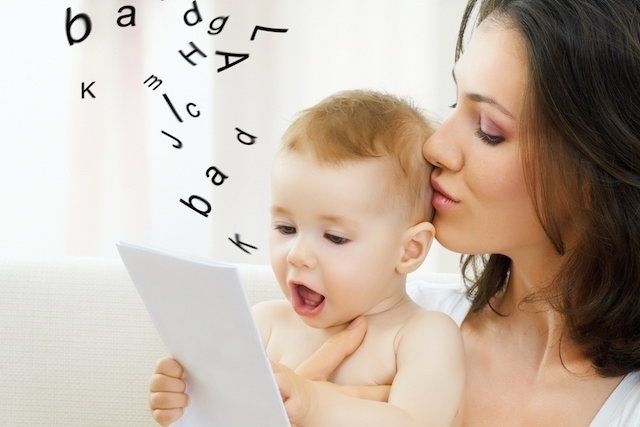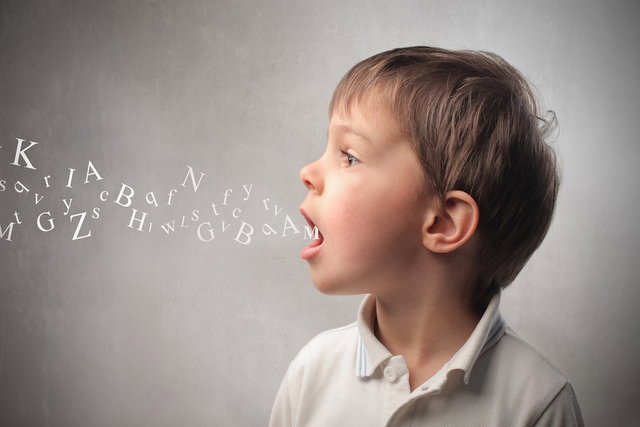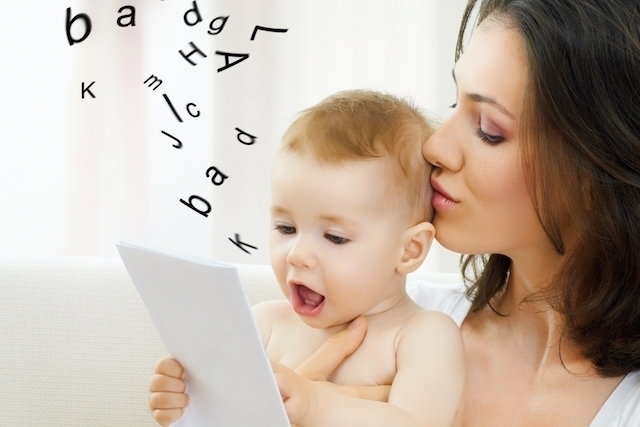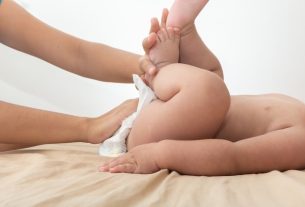The beginning of speech depends on each baby, and there is no right age to start talking. It can be considered that the baby begins to “talk” from birth, making sounds as a way of communicating with parents or people close to him and, as the months go by, communication improves until, around 9 months, he can put together simple sounds and starts to make different sounds like “mamamama”, “bababababa” or “dadadadada”.
However, around 12 months, the baby begins to make more sounds and tries to say the words that his parents or close people say most, at 2 years old he repeats the words he hears and says simple sentences with 2 or 4 words and at 3 year olds can say more complex information such as their age and gender.
In some cases, the baby’s speech may take longer to develop, especially when the baby’s speech is not stimulated or due to a health problem such as deafness or autism. In these cases, it is important to understand the reason for the baby not speaking, going to the pediatrician to have their development and language assessed.

What should speech development be like by age?
The development of a baby’s speech is a slow process that improves as the baby grows and develops:
At 3 months
At 3 months of age, crying is the baby’s main form of communication, and he cries differently for different reasons. Furthermore, he begins to pay attention to the sounds he hears and pay more attention to them. Understand what a baby’s crying could mean.
Between 4 and 6 months
Around 4 months the baby starts to babble and at 6 months he responds with small sounds like “ah”, “eh”, “oh” when he hears his name or someone speaks to him and starts to make sounds like “m” and “B”.
Between 7 and 9 months
At 9 months, the baby understands the word “no”, makes sounds combining several syllables such as “mamamama” or “babababa” and tries to imitate the sounds that other people make.
Between 10 and 12 months
The baby, around 12 months, can understand simple commands such as “give” or “bye”, makes sounds similar to speech, says “mama”, “dada” and makes exclamations such as “uh-oh!” and tries to repeat the words he hears.
Between 13 and 18 months
Between 13 and 18 months the baby improves his language, being able to use between 6 and 26 simple words, however he understands many more words and begins to say “no” by shaking his head. When he can’t say what he wants, he points to show and can show on himself or on a doll where the eyes, nose or mouth are.
Between 19 and 24 months
At around 24 months, he is able to say his first name and can put two or more words together, making simple, short sentences and knows the names of people close to him. In addition, he begins to talk to himself while playing, repeats words he heard other people saying and points to objects or images when he hears their sounds.
At 3 years old
At the age of 3, he says his name, whether he is a boy or a girl, his age, speaks the names of the most common things in everyday life and understands more complex words such as “inside”, “underneath” or “above” . Around the age of 3, children begin to have a larger vocabulary, can speak their friend’s name, use two or three phrases in a conversation and begin to use words referring to the person such as “I”, “me”, “we” or “ you”.

How to encourage your baby to talk
Although there are some speech development milestones, it is important to remember that each baby has their own pace of development, and it is important that parents know how to respect this.
Still, parents can help their child’s speech development through some strategies such as:
- At 3 months: interact with the baby through speech and mime, imitate the sound of some objects or the sound of the baby, listen to music with the baby, sing or dance to a gentle rhythm with the baby on your lap or play games, such as hide and seek and find the face;
- At 6 months: encourage the baby to make new sounds, point to new things and say their name, repeat the sounds the baby makes, saying the correct name of things or reading to them;
- At 9 months: calling the object by its name, making jokes saying “now it’s my turn” and “now it’s your turn”, talking about the names of things when he points or describing what he picks up, such as “round, blue ball”;
- At 12 months: when the child wants something, verbalize the request, even if you know what he wants, read it with him and, in response to less good behavior, say “no” firmly;
- At 18 months: ask the child to observe and describe the parts of the body or what they are seeing, encourage them to dance and sing the songs they like, use words that describe feelings and emotions, such as “I’m happy” or “I’m sad” , and use simple, clear sentences and questions.
- At 24 months: encourage the child, on a positive side and never as a critic, by saying words correctly such as “car” instead of “dear” or asking for help with small tasks and saying what they are doing, such as “let’s put the toys away”;
- At 3 years old: ask the child to tell a story or tell what they did before, encourage imagination or encourage the child to look at a doll and say whether they are sad or happy. At the age of 3, the “why” phase usually begins and it is important for parents to remain calm and respond to the child so that he or she does not become afraid to ask new things.
At all stages it is important that correct language is used with the child, avoiding diminutives or wrong words, such as “duck” instead of “shoe” or “woof woof” instead of “dog”. These behaviors stimulate the baby’s speech, making language development occur normally and, in some cases, even earlier.
In addition to language, it is important to know how to stimulate all of your baby’s developmental milestones, such as sitting, crawling or walking. Watch the video to find out what babies do at each stage and how you can help them develop faster:
When to consult the pediatrician
It is important to have regular consultations with the pediatrician throughout the baby’s development, however some situations require special attention, such as:
- At 6 months: the baby does not try to make sounds, does not make vowel sounds (“ah”, “eh”, “oh”), does not respond to the name or to any sound or does not establish eye contact;
- At 9 months: the baby does not react to sounds, does not respond when his name is called or does not babble simple words such as “mama”, “papa” or “dada”;
- At 12 months: cannot speak simple words such as “mama” or “papa” or does not respond when someone speaks to him;
- At 18 months: does not imitate other people, does not learn new words, cannot speak at least 6 words, does not respond spontaneously or is not interested in what is around him;
- At 24 months: does not try to imitate actions or words, does not understand what is said, does not follow simple instructions, does not speak words in an understandable way or just repeats the same sounds and words;
- At 3 years old: does not use sentences to talk to other people and only points or uses short words, not understanding simple instructions.
These signs may mean that the baby’s speech is not developing normally and, in these cases, the pediatrician should advise parents to consult a speech therapist so that the baby’s speech can be stimulated.

Sign up for our newsletter and stay up to date with exclusive news
that can transform your routine!
Warning: Undefined array key "title" in /home/storelat/public_html/wp-content/plugins/link-whisper-premium/templates/frontend/related-posts.php on line 12
Warning: Undefined array key "title_tag" in /home/storelat/public_html/wp-content/plugins/link-whisper-premium/templates/frontend/related-posts.php on line 13




